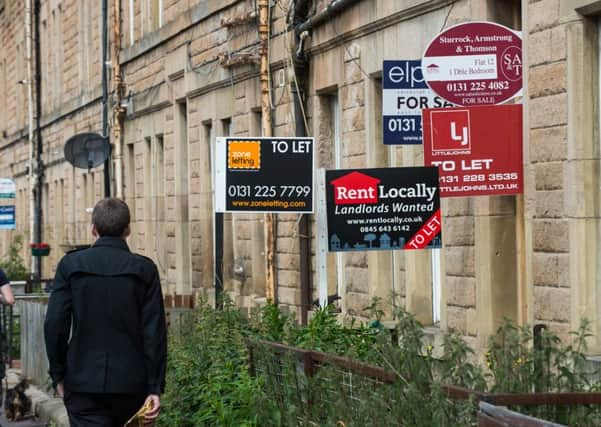David Alexander: Why buy-to-let's '˜third way' is still best
This article contains affiliate links. We may earn a small commission on items purchased through this article, but that does not affect our editorial judgement.


Slower growth in capital values (even a stalling in some locations), concerns over the effects of Brexit on tenant demand from EU citizens and greater regulation from Holyrood have all combined to make the sector appear less attractive than it once was.
And recent changes to tax relief are already hitting private investors particularly hard. The 2016/17 financial year was the last in which tax relief on mortgage interest was granted at 100 per cent; this has now dropped to 75 per cent with reductions in further stages over the following two years until it reaches zero on 6 April 2020.
Advertisement
Hide AdAdvertisement
Hide AdIndeed, the new regime kicked in last year with landlords no longer able to claim the annual “wear and tear” allowance. The government will gradually introduce a new annual relief on finance costs, which will settle at 20 per cent by 2020/21; however, this will only part-compensate.
Despite this, a survey of attendees at a recent seminar organised by DJ Alexander in conjunction with Johnston Smillie, chartered accountants, and Hampden & Co bank, provided a remarkable vote of confidence in the sector.
In response to two key questions, 94 per cent remained confident about investing in property and only 22 per cent said they were likely to sell all or part of their property investments in the next 12 months.
So why the sanguine attitude by current and potential landlords when the headlines suggest that buy-to-let may have peaked in investment terms?
There are several reasons, especially given the background of more recent entrants to the sector: individuals who had come into an inheritance or had taken a 25 per cent tax-free lump sum from a pension pot or simply found themselves with a substantial amount of monthly disposable income having just paid off the mortgage on a main home.
If these people did not want to expose their money to the vagaries of the stock market they had little alternative but to place the cash into savings and see their nest-egg drop in value because even with inflation at a long-term low, basic interest rates have been even lower. Given such circumstances, the “third way” – buy-to-let – was increasingly taken up by those not ultra-cautious or gripped by inertia.
Advertisement
Hide AdAdvertisement
Hide AdLonger-term landlords have already enjoyed substantial uplifts and as such are not unduly concerned by a correction, as long as their investments continue to provide an overall return.
Most pundits saythat interest rates have reached their nadir and the only way from now on is up. I agree, but given the size of public and personal debt any rise – barring some catastrophe – will be slow and gradual.
Consequently, even with growing taxation and regulatory costs, net rental income from rented properties is likely to outclass savings for some time. I have reasonable confidence that capital values will continue to grow, albeit at a lower level than a decade ago. Anyway, capital growth before the financial crash was unsustainable and if not checked risked creating a downturn in which many landlords could have got their fingers burned.
Properties in the most popular pockets usually achieve at or above the asking price. In areas where values and buyer competition are lower, newer landlords have become savvy at identifying suitable investments both for rental income and capital growth. Rather than choose a particular property by sticking a pin on a map they will now ask questions relating to proximity to employment and retail facilities and whether future values will be enhanced, or otherwise, by local planning guidelines, for example.
No one likes the tax changes or lower rental and capital growth. But, for most, buy-to-let still offers the security of savings allied to income and growth potential closer to equities. Our survey suggests that private investors are already learning to live with the “new reality” in which they find themselves.
• David Alexander is managing director of DJ Alexander